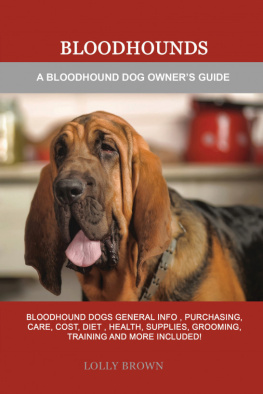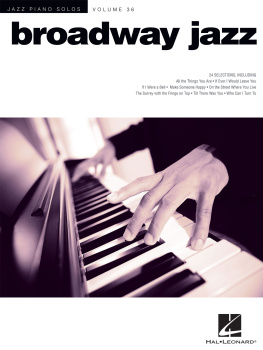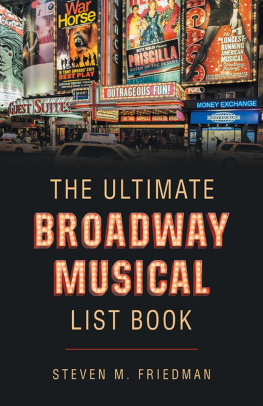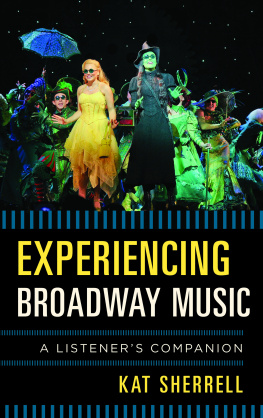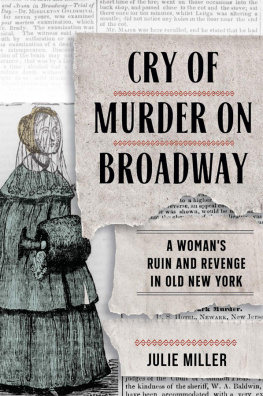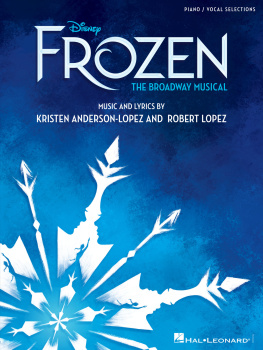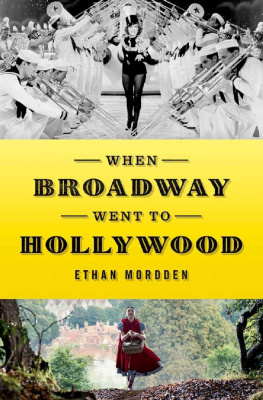Dejmon Ranon - The Bloodhounds of Broadway
Here you can read online Dejmon Ranon - The Bloodhounds of Broadway full text of the book (entire story) in english for free. Download pdf and epub, get meaning, cover and reviews about this ebook. genre: Romance novel. Description of the work, (preface) as well as reviews are available. Best literature library LitArk.com created for fans of good reading and offers a wide selection of genres:
Romance novel
Science fiction
Adventure
Detective
Science
History
Home and family
Prose
Art
Politics
Computer
Non-fiction
Religion
Business
Children
Humor
Choose a favorite category and find really read worthwhile books. Enjoy immersion in the world of imagination, feel the emotions of the characters or learn something new for yourself, make an fascinating discovery.

- Book:The Bloodhounds of Broadway
- Author:
- Genre:
- Rating:5 / 5
- Favourites:Add to favourites
- Your mark:
- 100
- 1
- 2
- 3
- 4
- 5
The Bloodhounds of Broadway: summary, description and annotation
We offer to read an annotation, description, summary or preface (depends on what the author of the book "The Bloodhounds of Broadway" wrote himself). If you haven't found the necessary information about the book — write in the comments, we will try to find it.
The Bloodhounds of Broadway — read online for free the complete book (whole text) full work
Below is the text of the book, divided by pages. System saving the place of the last page read, allows you to conveniently read the book "The Bloodhounds of Broadway" online for free, without having to search again every time where you left off. Put a bookmark, and you can go to the page where you finished reading at any time.
Font size:
Interval:
Bookmark:
Damon Runyon
The Bloodhounds of Broadway
One morning along about four bells, I am standing in front of Mindy's restaurant on Broadway with a guy by the name of Regret, who has this name because it seems he wins a very large bet the year the Whitney filly, Regret, grabs the Kentucky Derby, and can never forget it, which is maybe because it is the only very large bet he ever wins in his life.
What this guy's real name is I never hear, and anyway names make no difference to me, especially on Broadway, because the chances are that no matter what name a guy has, it is not his square name. So, as far as I am concerned, Regret is as good a name as any other for this guy I am talking about, who is a fat guy, and very gabby, though generally he is talking about nothing but horses, and how he gets beat three dirty noses the day before at Belmont, or wherever the horses are running.
In all the years I know Regret he must get beat ten thousand noses, and always they are dirty noses, to hear him tell it. In fact, I never once hear him say he is beat a clean nose, but of course this is only the way horse-racing guys talk. What Regret does for a living besides betting on horses I do not know, but he seems to do pretty well at it, because he is always around and about, and generally well dressed, and with a lot of big cigars sticking up out of his vest pocket. It is generally pretty quiet on Broadway along about four bells in the morning, because at such an hour the citizens are mostly in speakeasies, and nightclubs, and on this morning I am talking about it is very quiet, indeed, except for a guy by the name of Marvin Clay hollering at a young doll because she will not get into a taxicab with him to go to his apartment. But of course Regret and I do not pay much attention to such a scene, except that Regret remarks that the young doll seems to have more sense than you will expect to see in a doll loose on Broadway at four bells in the morning, because it is well known to one and all that any doll who goes to Marvin Clay's apartment, either has no brains whatever, or wishes to go there.
This Marvin Clay is a very prominent society guy, who is a great hand for hanging out in nightclubs, and he has plenty of scratch which comes down to him from his old man, who makes it out of railroads and one thing and another. But Marvin Clay is a most obnoxious character, being loud and ungentlemanly at all times, on account of having all this scratch, and being always very rough and abusive with young dolls such as work in nightclubs, and who have to stand for such treatment from Marvin Clay because he is a very good customer.
He is generally in evening clothes, as he is seldom around and about except in the evening, and he is maybe fifty years old, and has a very ugly mug, which is covered with blotches, and pimples, but of course a guy who has so much scratch as Marvin Clay does not have to be so very handsome, at that, and he is very welcome indeed wherever he goes on Broadway. Personally, I wish no part of such a guy as Marvin Clay, although I suppose in my time on Broadway I must see a thousand guys like him, and there will always be guys like Marvin Clay on Broadway as long as they have old men to make plenty of scratch out of railroads to keep them going.
Well, by and by Marvin Clay gets the doll in the taxicab, and away they go, and it is all quiet again on Broadway, and Regret and I stand there speaking of this and that, and one thing and another, when along comes a very strange-looking guy leading two very strange-looking dogs. The guy is so thin I figure he must be about two pounds lighter than a stack of wheats. He has a long nose, and a sad face, and he is wearing a floppy old black felt hat, and he has on a flannel shirt, and baggy corduroy pants, and a see-more coat, which is a coat that lets you see more hip pockets than coat.
Personally, I never see a stranger-looking guy on Broadway, and I wish to say I see some very strange-looking guys on Broadway in my day. But if the guy is strange-looking, the dogs are even stranger-looking because they have big heads, and jowls that hang down like an old-time faro bank dealer's, and long ears the size of bed sheets. Furthermore, they have wrinkled faces, and big, round eyes that seem so sad I half expect to see them bust out crying.
The dogs are a sort of black and yellow in color, and have long tails, and they are so thin you can see their ribs sticking out of their hides. I can see at once that the dogs and the guy leading them can use a few hamburgers very nicely, but then so can a lot of other guys on Broadway at this time, leaving out the dogs.
Well, Regret is much interested in the dogs right away, because he is a guy who is very fond of animals of all kinds, and nothing will do but he must stop the guy and start asking questions about what sort of dogs they are, and in fact I am also anxious to hear myself, because while I see many a pooch in my time I never see anything like these.
"They is bloodhounds," the sad-looking guy says in a very sad voice, and with one of these accents such as Southern guys always have. "They is man-tracking bloodhounds from Georgia."
Now of course both Regret and me know what bloodhounds are because we see such animals chasing Eliza across the ice in Uncle Tom's Cabin when we are young squirts, but this is the first time either of us meet up with any bloodhounds personally, especially on Broadway. So we get to talking quite a bit to the guy, and his story is as sad as his face, and makes us both feel very sorry for him.
In fact, the first thing we know we have him and the bloodhounds in Mindy's and are feeding one and all big steaks, although Mindy puts up an awful squawk about us bringing the dogs in, and asks us what we think he is running, anyway. When Regret starts to tell him, Mindy says never mind, but not to bring any more Shetland ponies into his joint again as long as we live.
Well, it seems that the sad-looking guy's name is John Wangle, and he comes from a town down in Georgia where his uncle is the high sheriff, and one of the bloodhounds' name is Nip, and the other Tuck, and they are both trained from infancy to track down guys such as lags who escape from the county pokey, and bad niggers, and one thing and another, and after John Wangle gets the kinks out of his belly on Mindy's steaks, and starts talking good, you must either figure him a high-class liar, or the hounds the greatest man-trackers the world ever sees.
Now, looking at the dogs after they swallow six big sirloins apiece, and a lot of matzoths, which Mindy has left over from the Jewish holidays, and a job lot of goulash from the dinner bill, and some other odds and ends, the best I can figure them is hearty eaters, because they are now lying down on the floor with their faces hidden behind their ears, and are snoring so loud you can scarcely hear yourself think.
How John Wangle comes to be in New York with these bloodhounds is quite a story, indeed. It seems that a New York guy drifts into John's old hometown in Georgia when the bloodhounds are tracking down a bad nigger, and this guy figures it will be a wonderful idea to take John Wangle and the dogs to New York and hire them out to the movies to track down the villains in the pictures. But when they get to New York, it seems the movies have other arrangements for tracking down their villains, and the guy runs out of scratch and blows away, leaving John Wangle and the bloodhounds stranded.
So here John Wangle is with Nip and Tuck in New York, and they are all living together in one room in a tenement house over in West Forty-ninth Street, and things are pretty tough with them, because John does not know how to get back to Georgia unless he walks, and he hears the walking is no good south of Roanoke. When I ask him why he does not write to his uncle, the high sheriff down there in Georgia, John Wangle says, there are two reasons, one being that he cannot write, and the other that his uncle cannot read.
Font size:
Interval:
Bookmark:
Similar books «The Bloodhounds of Broadway»
Look at similar books to The Bloodhounds of Broadway. We have selected literature similar in name and meaning in the hope of providing readers with more options to find new, interesting, not yet read works.
Discussion, reviews of the book The Bloodhounds of Broadway and just readers' own opinions. Leave your comments, write what you think about the work, its meaning or the main characters. Specify what exactly you liked and what you didn't like, and why you think so.

